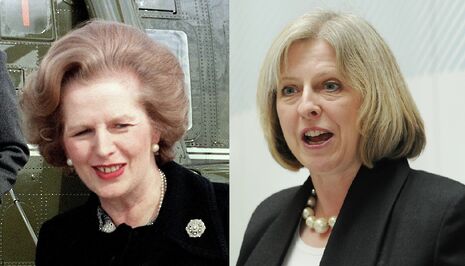Why are there so many Iron Ladies?
The way we talk about women in politics is deeply flawed, argues columnist Guy Birch

How do we talk about women in politics? If we, as we almost always should, dismiss the claims of Fox’s Bill O’Reilly, then we can see that Hilary Clinton’s gender played a role in her defeat in November’s election. This can be seen in campaign slogans, debates about what a president looks like, and, ultimately, the victory of Trump despite his misogyny and alleged assault. Even if we look beyond Clinton’s loss, however, to women who have fought and won elections, we discover a wide range of approaches. Guy Adams in the Daily Mail, for example, once described Angela Merkel as “a handbag woman who, like [Theresa] May, prefers large, brightly coloured designer numbers which sometimes clash with her suits.”
Beyond such facile and lazy journalism, however, it may well be considered inevitable, following our second female Prime Minister’s speech on Brexit last week, that she would be compared with our first, Margaret Thatcher. Indeed, the right wing news relished such an opportunity. Both James Slack in the Mail and Andrew Grice in the Independent wrote pieces enthused and saturated in such nostalgic and unpleasant commentary. But how appropriate is this kind of analysis of Theresa May, is she comparable in anything other than gender to Thatcher? Hadley Freeman in the Guardian mocked such examinations, jibing, “women are such rare creatures that they can only be understood through the prism of one another, like unicorns or sporting triumphs by the England football team.”
“Trump’s labelling of Clinton as ‘a nasty woman’, mirrored by Kenneth Clarke’s description of May as ‘a bloody difficult woman’.”
While it is farcical and demeaning to label anyone by their choice of bag or jacket, it is equally inappropriate to use terms like ‘iron willed’, ‘steely determination’ or, most famously, ‘iron lady’. Such terms dehumanise successful female politicians. It makes the likes of Merkel, Thatcher and May seem alien and somewhat robotic. It does not, sadly, promote a greater involvement in politics from men or women. At worst these terms are sexist, with (yet again) Trump’s labelling of Clinton as a “nasty woman”, mirrored by Kenneth Clarke’s description of May as “a bloody difficult woman”, serving as a reminder of the difficulty women still face in reaching the top of global politics.
This goes beyond politics: I am not an advocate of May’s policies, nor those of her cabinet. However, political debate should be built on a foundation of a leader’s ideas, implementations and shortcomings, not on an imagined narrative of continuity from one female politician to another.
When you look at May and Thatcher on policy, something remarkably ignored in both Slack’s and Grice’s pieces, we find a wealth of differences and nuance beyond the somewhat offensive remark in the latter’s article, that May’s programme is simply Thatcherism “with a heart”. Indeed, analysis between May’s and Thatcher’s speeches on the European Union (though it must be remembered and restated that the E.U. has undergone many changes between the two Prime Ministers), reveal very different foci. Thatcher focused on Britain’s shared history in Europe, declaring, in a speech to the College of Europe in 1988, that “Britain does not dream of some cosy, isolated existence on the fringes of the European Community. Our destiny is in Europe, as part of the Community.” Theresa May’s most recent speech, however, in what was in many ways a more nuanced and better written version of Donald Trump’s inaugural speech where he twice exclaimed “America first!“, was focused on nationalism and immigration.
However, an area in which we do see a similarity between the policies, and, to a lesser extent perhaps, the language of May and Thatcher is in their discussion of nuclear weapons. At a speech at a Soviet Banquet in March 1987, Margaret Thatcher, in her address to then general secretary of the USSR, Mikhail Gorbachev argued that, “A world without nuclear weapons would be less stable and more dangerous for all of us.” Theresa May, in July of last year, when challenged on whether the new PM would authorise a nuclear strike by the SNP MP George Kerevan, replied, “Yes. And I have to say to the honourable gentleman the whole point of a deterrent is that our enemies need to know that we would be prepared to use it.” This, for many, somewhat shocking statement is again linked to gender. Much of the right is terrified of the perception of a ‘weak leader’, and this fear is expressed in such moments. ‘Weak leadership’, at least in tabloid journalism is the domain of Jeremey Corbyn, not a Conservative Prime Minister. Both Thatcher and May are forced to adopt such ‘strong’ positions to counter balance sexist ideas of gender and authority. It is concerning that it is on the subject of nuclear weapons where this ‘strength’ is revealed, marginalising the idea that it takes a much greater strength to answer violence with diplomacy.
It is, therefore, on policy where we should focus our attention. No journalist would ever compare David Cameron to Lord North for both resigning from their offices following embarrassing defeats. Theresa May should be critiqued or lauded on her own terms, not Thatcher’s. May is carving out her own path for Britain in 2017, if we sit around comparing it to the politics of the 70s and 80s, we might just miss it
 News / Cambridge bus strikes continue into new year16 January 2026
News / Cambridge bus strikes continue into new year16 January 2026 News / Local business in trademark battle with Uni over use of ‘Cambridge’17 January 2026
News / Local business in trademark battle with Uni over use of ‘Cambridge’17 January 2026 News / Uni members slam ‘totalitarian’ recommendation to stop vet course 15 January 2026
News / Uni members slam ‘totalitarian’ recommendation to stop vet course 15 January 2026 Interviews / The Cambridge Cupid: what’s the secret to a great date?14 January 2026
Interviews / The Cambridge Cupid: what’s the secret to a great date?14 January 2026 Science / Why smart students keep failing to quit smoking15 January 2026
Science / Why smart students keep failing to quit smoking15 January 2026









